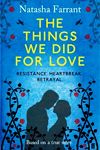Genre: Historical YA
Rating: 6/10
Goodreads
 |
As war rages in Europe, teenagers Luc and Arianne fall passionately in love. But German forces are closing in and Luc, desperate to atone for his family's past, is drawn into the dangerous world of the Resistance. Arianne will do almost anything to keep him safe, but someone else is secretly in love with her - someone who will stop at nothing to get rid of his rival... |
This review is proof that I find it very difficult to differentiate between how I feel about a book and how good a book actually is. I think this book does all that it sets out to do and as a book meant for teens I think it would probably work really well as an introduction to war fiction. The plot is loosely based on real events during the French Occupation (if you'd like to know which ones click here) though the central characters and their relationships are fictional. The Things We Did for Love is compelling - I read it in two sittings - and although the book isn't very long (only about 230 pages) I did get a real sense of place and the character dynamics were really efficiently set out. In all those respects the book is good, it works but ultimately, I was left feeling a little unsatisfied.
I love war stories and I love YA but I'm beginning to realise that war stories told in historical YA don't work for me. My problem with The Things We Did for Love is that the story it establishes is one in which the choices made by Luc, Arianne, Romy and their families directly contribute to later events. They make choices and those choices have consequences. But the book finishes too soon and crucially, changes the narrator for the final section, so that we don't get to see the characters coming to terms with what they set in motion. Questions of morality are always complicated, especially so in war time yet the book's conclusion ends up negating the moral ambiguities of our protagonists' actions by ending with an event which we can all understand as being terrible and unforgivable. I love that books such as this are telling stories in which teenage characters are agents whose actions do have an impact but I want to read books which are expressly about those choices and their consequences. I want books which not only raise questions of agency and complicity but which explicitly explore them through character arcs.
Some of the best discussions of conflict and rebellion etc. occur in YA (Patrick Ness' Chaos Walking Trilogy is a really glorious example of this) but they always seem to be lacking in YA based on 'real' history. I acknowledge that as a 24yr old historian I'm probably not considered to be among this book's target audience and, like I said before, I think the book succeeds with what it wants to do (namely tell the story of a historical atrocity in a way that will most engage a teenage audience) but it raises some interesting questions about the difference between using fictional characters to tell war stories and using fictional wars to tell character stories.

No comments:
Post a Comment